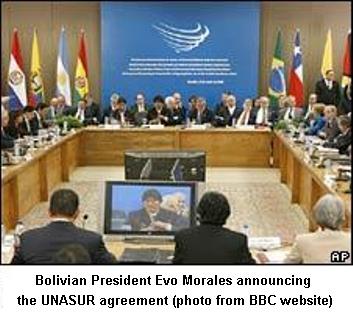|
|
President Morales Stresses Historic Nature of Unasur
an article by Agencia Bolivariana de Noticias
Brasilia, 23 May
The President of Bolivia, Evo Morales, emphasized the historic character that represents the signing of the Treaty establishing the Union of South American Nations (Unasur), which took place on Friday in Brasilia.

This treaty is the triumph of dialogue and the result of a thorough discussion among our delegates to reach consensus because all countries have made proposals, we have listened and we have decided to seek the consensus of all," he said.
Morales reiterated that this document reflects the agreement between the twelve nations in the integration and union of the southern countries, and includes the participation of Caribbean States.
"It is historic because it is the dream of our ancestors, the struggle of our union leaders, social, political independence who took a gamble and I feel that we started to comply with this fight," he said.
During his speech, he highlighted, among some elements of the treaty signed, support for the multi-ethnic and multilingual histories of the South American nations.
"A culture of peace in a world free of nuclear and mass destruction, without imperialism or colonialism, where all states be equal, this is the world we want," he said.
He recalled that the principles that guide Unasur are the unrestricted respect for the sovereignty of nations; inviolability and integrity of States; self-determination of peoples, solidarity and cooperation, reciprocity and complementarity; peace, democracy, universal human rights; reduction of the asymmetries and harmony with nature for sustainable development.
"Let the people decide, submit to them and not to big money, with citizen participation and pluralism. A participatory democracy and not only of polls every four or five years, so that our peoples can not only elect our authorities but also can revoke them, that is most democratic, "he added.
Among the accomplishments assumed by the temporary presidency of Bolivia, he cited the formation of the Treaty of Unasur, a transitional mechanism for the functioning of the secretary general and the operation of six committees aimed at specific items of financial integration, energy, infrastructure, social policies , education and dispute resolution mechanisms.
Editor's note: For complete article, click here.
|








|
DISCUSSION
Question(s) related to this article:
Where in the world can we find good leadership today?,
* * * * *
Latest reader comment:
Once again, as they have done now each year since 2009, the Nobel Women's Initiative provides biographies of 16 women leaders involved in local action for peace and justice around the world, and in particular to stop violence against women. Last year's biographies were listed in the CPNN discussionboard.

|
|









